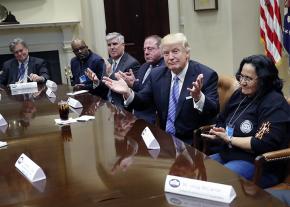Is the left with Trump against the TPP?
Donald Trump signed an executive order on Monday officially abandoning the Trans-Pacific Partnership, the sweeping, 12-nation economic agreement negotiated by the outgoing Obama administration that Congress had yet to ratify. Trump was making good on a centerpiece of his right-wing presidential campaign--yet some on the left and the labor movement praised Trump. Bernie Sanders, for example, said in a statement: "If President Trump is serious about a new policy to help American workers, then I would be delighted to work with him"--and AFL-CIO President Richard Trumka even claimed credit on behalf of "a powerful coalition of labor, environmental, consumer, public health and allied groups came together to stop the TPP."
Here, SW contributor challenges the logic of the left lining up behind Trump's reaction, in an article based on a comment posted on Facebook.
I HATE the Trans-Pacific Partnership (TPP), which Donald Trump also opposes. But labor and the left need to make sure we don't fall into the trap of Trump's economic nationalism--which is just changing the terms by which U.S. capitalism exploits the working population at home, while trying to keep its global dominance against China's rise.
Trump's rhetoric and even threatened action against free trade--a border tax on U.S. companies that move production, restrictions on exports and imports--are calculated to continue the myth that he is for ordinary working people.
And since Barack Obama and Hillary Clinton and Bill Clinton were more or less supportive of every free trade agreement they could get their hands on, Trump's narrative that he was defending workers against a pro-free trade establishment seems to fit.
The reality, though, is this: Trump's economic nationalism and rejection of the TPP goes hand in hand with racist and anti-immigrant ideology, Islamophobia and an imperialist agenda that seeks to expand U.S. economic and military dominance.

For Trump, saying "Stop the TPP" goes along with saying "No Syrian and Somali refugees," "Build the Wall" and accelerate deportations, and "Keep Muslims Out."
Trump's claim is that he will keep jobs here for U.S. workers. But he also opposes fights for wage increases and for unionization, and he proposes to detain and deport undocumented workers.
How is that a victory for workers in the U.S.? Are the jobs resulting from Trump's policies going to be available to all? Will they have decent wages and benefits? Are they going to come with health benefits, with access to reproductive rights?
Will Trump restrict oil pipelines and defend Indigenous rights, or order a pipeline building boom and trample over those rights?
And when U.S. workers fight back, they will face a more repressive police force, armed with even more military hardware and emboldened through Trump's attack against the movement for Black Lives. Housing and education will continue to be a struggle for the working class and the poor, especially for people of color.
While individual capitalists may be hurt temporarily by policies that curb free trade and impose protectionism, Trump's aim, in fact, is to strengthen the hand of the U.S. capitalist class as a whole. Stay at home and be rewarded with a sweet deal for profits--that's his message to U.S. capitalists.
And given Trump's own expansion of his businesses worldwide, I don't really believe the restrictions he proposes will hold U.S. capital back from global opportunities, but only change the terms.
While it may seem like the language of borders and barriers unites Trump's policies, this is highly selective. In terms of military might or trade with allies like Israel, India and Saudi Arabia, the policies will be about unfettered movement and access across borders.
SO THE left needs to be wary of Trump's economic policies that are sold as a defense of U.S. jobs, because they are part of a larger agenda--one that Barack Obama and Bill Clinton carried out through different means and with different rhetoric to a different domestic audience.
We need to be especially wary right now because the anti-imperialist politics of the U.S. left are pretty weak in the wake of the fall of the antiwar movement from a decade ago.
It's not a coincidence that Bernie Sanders' critique of the Democratic status quo on trade marks the key place where his policies and rhetoric come closest to Trump's. As I wrote during the Sanders campaign for the Democratic presidential nomination, his left version of economic nationalism left much to be desired.
The left needs to stand firm and develop our own principles, not of economic nationalism or "anti-globalization," but, as we called it in the period between the Battle of Seattle and the 9/11 attacks, of "global justice." That goes hand in hand with anti-imperialism and internationalism.
But we have to do better than the global justice movement of the late 1990s, at least the U.S. version, which also had a dose of economic nationalism engrained in it. The proof is in the pudding: when 9/11 happened and the war in Afghanistan began, the global justice movement collapsed, while liberals and progressives fell in line with support for imperialist war---a long war that has not abated since.
Imperialism is about economic and military policies working together to ensure the continued dominance of the wealthiest capitalist countries and their allies over the rest. The forms of these policies change: free market or protectionism; boots on the ground or drone strikes; multilaterally through the UN or unilaterally by the U.S. alone.
But for the working class in the U.S. and around the rest of the world, one thing doesn't change: Imperialism kills. Period.


